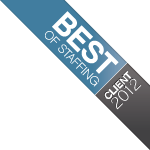A Quick Q&A for Managers about Praise and Your Employees
|  |
 Recognizing good performance should happen on a weekly, if not daily, basis, and it should be given in sincere reaction to what has been achieved.
Recognizing good performance should happen on a weekly, if not daily, basis, and it should be given in sincere reaction to what has been achieved.
But praise is one of those management skills where a balance is absolutely crucial--too much devalues it, when it becomes the norm and nothing special; not enough, and your employees will feel undervalued and that the work they do goes unnoticed.
Are there right ways and wrong ways to give praise? Who should give it to whom, and why is it important? Let's break it down into a "Top Ten" list:
1. What exactly is "praise," especially in a workplace context?
Simply put, praise means recognizing someone for something positive that they did. You can also call it positive recognition, positive feedback, a pat on the back, props, kudos or just a compliment.
2. Why is it important for managers to praise their employees?
One of the most basic findings in psychology is that rewarding a specific behavior increases the likelihood of the behavior being repeated. Praise serves as an important reward and motivation for good work.
Praise also strengthens the relationships a manager has with his or her direct reports. People want to know their manager cares about them enough to pay attention to what they are doing. They also want to know their contributions are genuinely appreciated. Most leaders agree that praise generates better morale and higher productivity.
3. Can you overdo it?
Think about it this way: How many managers have you worked for that gave you too much praise? Have you ever gotten tired of being told that you're doing great work?
4. So why don't more/all managers give praise?
Giving praise effectively doesn't always come naturally. Most managers are unskilled in how and when to praise those around them, relying on short-term and minimal return programs like "Employee of the Month" instead. Or they think they don't have time to run around praising people, or they think their employees should just be happy to have a job, or they just don't think to concentrate on the positive.
5. How DO you give praise effectively? And is it possible to screw it up?
Let's get the negative out of the way first: Yes, it's possible to screw up giving praise. Mostly because many people are as bad at receiving praise as others are about giving it. They shrug it off, get embarrassed, say it was nothing. As a result, a manager might push too hard, or might pull back.
How do you do it right? Praise should be:
- Timely--don't wait too long! If you can't do it in person, send a note.
- Sincere--don't push too hard or make things up just to find something to praise. Look for the good, and it will happen.
- Specific--describe the behavior or action and explain why the action or behavior was such a good thing. "Nice work, Matt" is much less motivating than describing specifically what was done. Specific praise shows employees that you are paying attention to what they do and how they do it.
6. Shouldn't praise be a two-way street? Is it all right for employees to praise the boss, or is that sucking up?
Yes, it's fine for employees to praise the boss, as long as you're doing it to sincerely recognize and show appreciation for something positive, not to gain brownie points.
7. Should you give praise privately or publicly?
There are pros and cons to both, so the answer to this is "it depends"--on the situation, and on the individual's preference. Think about each employee and what motivates them.
8. So how can managers get started?
Make recognizing employees a part of your weekly "to-do" list. Write down the names of the people who report to you and make it a point to note examples of them going "above the norm" according to the duties and responsibilities of their job descriptions.
If you're not confident enough yet to praise in person, use voicemail. Or even write a quick thank-you note.
Don't praise ordinary performance. If you praise employees for doing routine tasks, they won't be encouraged to do better. You'll have set the bar too low. Raise it, so that your praise will be of value to your employees when they do exceptional work.
Remember, recognizing effort and achievement is self-reinforcing: When you do a better job of recognizing employees, they tend to perform better--and that results in even more achievements you can recognize and praise.





